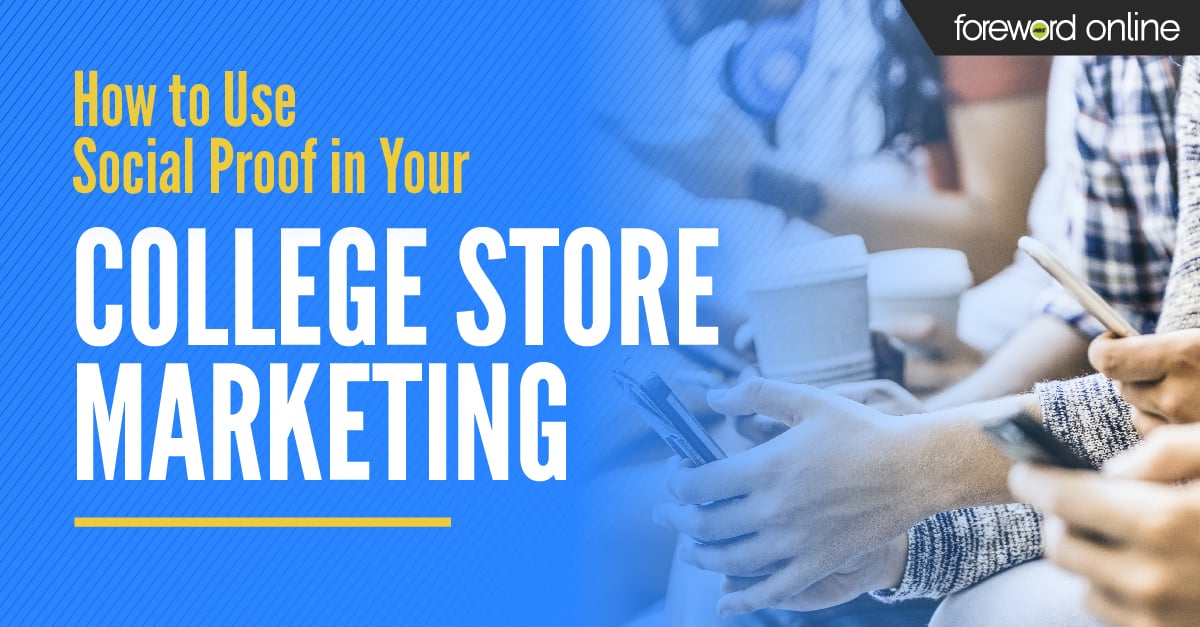When you are shopping, does an advertisement you saw online entice you to buy more than talking to a friend who tells you about a great sale or deal they found? Probably not. Students, like any shoppers, want to know they are getting high-quality merchandise for a fantastic price, but in the world of retail marketing, everyone claims their products are the best and that they are giving you the deal of a lifetime. Naturally, firsthand experiences are easier to trust.

The term social proof was coined by Dr. Robert Cialdini in 1984. It describes the psychological and social phenomenon where people have a tendency to conform to the actions of others. For example, if you were shopping online and found two nearly identical vacuum cleaners, but one of them had 1,000 four and five-star reviews and other had only 10 reviews that were mostly negative, which one would you select? The choice would be simple: the one with more reviews. Without seeing the vacuum cleaners, you would be able to make an informed decision based on the experience of others.
Decisions like this feel so good, in fact, today’s shoppers still rely on customer reviews and testimonials when shopping in-store.
According to Barnes & Noble College research, when students use mobile shopping apps, 60% use the app to research products before making an in-store purchase.
With a world of information held in the palm of their hands, students can easily check online for product reviews, do price comparisons and ask their friends what they think. This is why it is important for college stores to build their omnichannel presence and use social proof to strengthen their position on campus.
3 ways to use social proof in college store marketing
- Start using influencer marketing
One growing form of marketing is influencer marketing. With this approach brands pay “influencers” to endorse their products. Influencers could be anyone from a movie star, athlete or musician to a student with a large social media or YouTube following.
With influencer marketing, larger fanbases do not necessarily mean larger the results. For example, many small start-up brands have gained industry traction by using smaller influencers who have a more personal relationship with their fanbase. Forty percent of shoppers say they have made an online purchase after seeing an influencer use it.
One way your store can use influencer marketing is to take an approach like the GVSU Laker Store. This college store has grown their social media reach and honed their strategy by having students model their merchandise. Student photographers photograph volunteer student models, and the images are shared on social media. Not only do GVSU students see recognizable faces in their social media posts, but they also see more authenticity in the advertising. - Strengthen your omnichannel presence
Does your college store have a mobile app? Was it designed to provide something of value to students? Do you have an eCommerce site where students can leave product reviews?
Gen Z students are true digital natives. They don’t remember a time before smartphones. Students expect access to apps and websites that streamline their experience and blend seamlessly with their in-store experience. More than that, though, these channels are often students’ first means of collecting information about your store. Visible customer reviews can make a difference on whether or not students decide to shop with you.
In a study conducted by BrightLocal, 88 percent of shoppers said they trusted online reviews as much as personal recommendations. Enabling online reviews is a simple way to give students a voice and offer more store transparency. Yes, some bad reviews will inevitably come in, but that also gives your store an opportunity. You can identify problems and find solutions to those issues. You can show students that your store cares about them and their experience..gif?width=850&name=Gif2%20(1).gif)
One example of the power on online reviews if from the UK clothing retailer Figleaves. When this company added customer reviews to their product pages, they saw a 5% higher conversion rate on products with reviews. The product with more than 20 reviews had a 83.8% higher conversion rate. - Ask customers to share your products
This might be the most difficult of the three. Asking customers to leave reviews isn’t easy to do, even when you know the customer is very happy with their service. However, Gen Z students not only read reviews, but they also tend to be willing to leave them. If your store goes out of its way to help a student, ask them to leave a review.
In addition, start a social media hashtag that students can use when they share pictures themselves wearing something they got in your store on their social channels. Maybe offer students a discount on their next purchase if they share images of themselves donning your merchandise along with the store hashtag.
Though shoppers use reviews, they often don’t make the connection that it is important it is to actually leave a review for stores and small businesses. A gentle reminder can be the motivation they need to share how much they liked working with your staff or the products they purchased in your store.
Social proof is an essential part of today’s shopping experience. With so many products and options to choose from, social proof is the best way for customers to ask questions and find exactly what they want. Make sure your store is in a position to meet student expectations and support every shopper both in-store and online.





